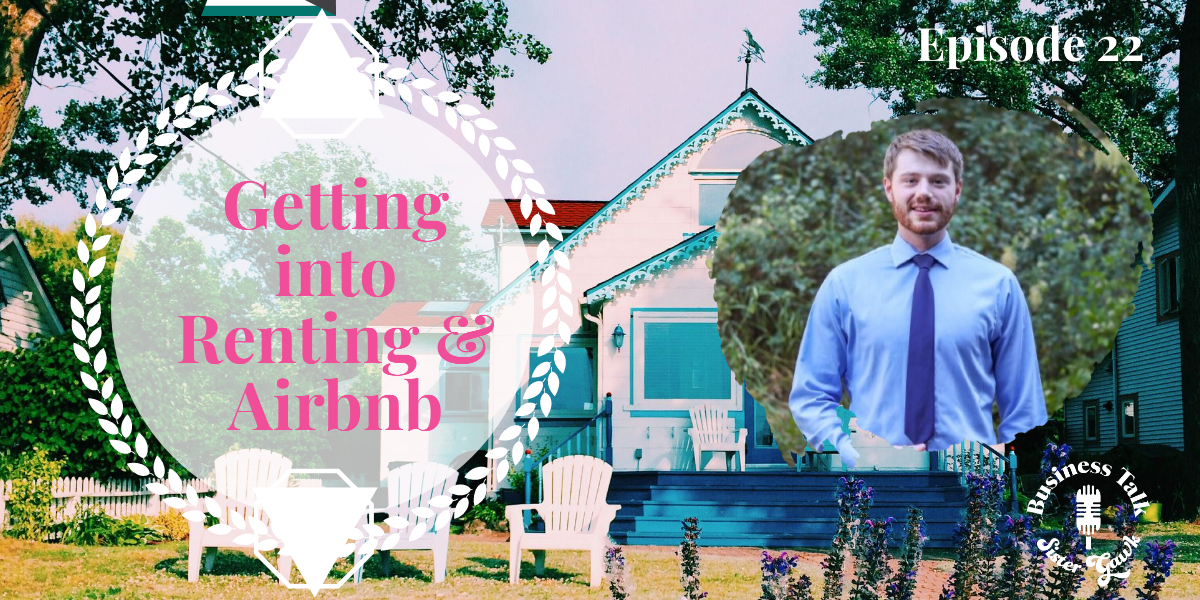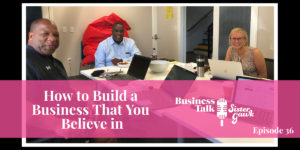This episode interviews Bridger Hopkins about his journey into rental property and using Airbnb as a business platform. From selling over 200 chickens to quitting his senior year of basketball to renovate a foreclosure. Hearing his perspective on turning passion into profit is a good lesson for any young entrepreneur.
Bekkah: Bridger is someone that I have admired for a long time, because he’s a serial entrepreneur and one of the youngest experiences I had with entrepreneurship was just watching him with his different business endeavors and so he’s been doing it for a long time and we’re super excited to hear a little bit more about the things that he’s been doing recently and hear the story about how he got there. Bridger, thanks so much for being here with us today.
Bridger: Hey, thanks for having me.
What Do You Do As An Entrepreneur?
Bekkah: Tell us a little bit about what you do.
Bridger: My full-time gig is I work at a paper company but on the side, I’m always working on some kind of project I guess you could say. Some of my recent ones have been Air B&B as well as I’ve been building and flipping houses and those projects keep me pretty busy.
Bekkah: How did you start this process? Where were you getting interested in business and what was your journey to get there?
Bridger: My dad has always been an entrepreneur. He’s an electrician and he’s also a contractor. He has his own company. My parents have owned five or six different restaurants over the years. I’ve always grown up in that atmosphere where you’re thinking about business, thinking about how you can monetize something. Looking at customers you can serve. That was really helpful to me as a kid. It even allowed me to venture out when I was a kid and do some of my own little projects.
How Did You Start Getting Into Business Ventures?
Ruthie: What did that look like? It seems like there was decently low-risk in having your parents help with that. How influential were your parents with encouraging you to pursue different business ventures?
Bridger: My parents were always very supportive of stuff I took on. One thing that I’ve always been bent towards was if there’s something that I enjoy doing, how can I do it for free? Or how can I somewhat monetize a hobby that I enjoy so that it’s not just somewhere that I dump money into? As a kid, I really enjoyed raising chickens, ducks, a little menagerie of different critters. My parents were reluctantly supportive of that. But what that ended up growing into was selling eggs on the side and eventually growing into selling chickens for meat. That was probably a four or five-year process for me starting out with never raising a chicken for meat.
I started out because I wanted to have some for us, just our family. I went through and did a lot of research on what I needed to do. Then I figured out how much food, how much time. Then I figured if I raised above and beyond what we wanted – how many I would need to raise and sell to cover the cost for our chickens. So that’s kinda how it started. I didn’t want to put up all the money just to have some chicken to eat as an eleven-year-old or twelve year old.
That’s where it began and eventually, I went from, I think it was twenty-five birds to fifty to a hundred and fifty and I think in the last year I raised over two hundred and sixty birds.
Bekkah: Holy Buckets!
Bridger: Yeah! That’s a lot of chickens. That whole time I did have the support of my parents. I was able to recruit my grandfathers a few times to help butcher chickens. So I had a lot of back-ups. Those experiences really played into probably more so a way of thinking. How can I monetize this? This thing that I enjoy or this thing that I want to do. And even from there, there’s a big difference from having twenty-five chickens to two hundred sixty chickens, so coming up with systems, changing the way I was purchasing my materials, my actual chickens, the food, all of that. Looking to buy in bulk, finding different vendors, all that sort of stuff. That’s where I got my first exposure really.
How Did You Transition Entrepreneurship Into Property Management?
Bekkah: What made you transition from doing all these chickens to all of a sudden being like, “Ok, I’m going to try rentals and property management.”
Bridger: It actually started again in probably middle school. It must have been middle school – early high school. Ruthie will probably like this, I started listening to the Dave Ramsey Financial Peace University. At that time I was fourteen but we just had the audio of the fourteen sessions. We listened to those with my dad. Probably two things that stood out were going to school without having any debt and then also real estate. I kind of saw the real estate lesson as a way to leverage my education in a way that I wouldn’t have to pay for it without using loans.
Foreclosures Are An Inexpensive Place to Start in Property Management
I really looked at buying a foreclosure house, something that was relatively inexpensive, put some sweat equity into it, have a place to stay while I went to school and then even upon selling being able to pay for the continuance of my education.
Ruthie: That was your first buy, one that you would stay at while you were in college?
Bridge: My senior year of high school, my dad and I went in on purchasing a house that was foreclosed on and right in town in northern Minnesota. I had made plans already to go to the community college, Itasca Community College. So I kinda had my plans somewhat laid out at least for a few years, so that senior year I quit basketball and went to town working on this house. Pretty much remodeling the whole thing. I was tiling bathtubs surrounds at four in the morning before going to school.
Ruthie: Wow.
Bridger: And there again after school. We started that in September and I moved in in June after I graduated and from that point I had roommates. We actually built an apartment in the basement so I think I actually moved three times in the house. From the second floor to the basement back to the second floor. Just kinda depending on the arrangements I had for roommates or renters. That was really my first taste of renting. That can definitely be interesting.
Ruthie: So you’re a senior in high school. You’ve made this huge sacrifice to quit basketball and you’re life is kind of looking different than most of your peers I imagine. What were their responses to that? What kind of comments did you get from people you went to high school with?
Bridger: A lot of weird looks. A lot of people thought I was really cool that we were doing that but I don’t think a lot of people could really comprehend like, “why are you doing that?” I think a lot of people have the belief that they want to go, you know, go to school, go off somewhere else, get out of town. At that point I was pretty much cementing that I was going to be, at least for a few more years, I was going to be in my hometown. I think even on a base level that some people couldn’t really compute the reason for me doing that. Not taking out loans. Not having to leverage myself that way.
Ruthie: Just out of curiosity were you able to pay for school without loans?
Bridger: I lived at that house for two years while I was going to ICC and like I said, I had the whole gambit of good renters, bad renters, good roommates, to not so good roommates. At the end of the two years I’d gotten married and moved out to Idaho to go to the University of Idaho. Go, Vandals. We sold the house. We had made it through two years already of school. Paid for our third year and then worked our way through the last bit and we never took out a loan. We each had three jobs, two to three jobs at any given time. But yeah, made it through.
What Process Is There To Setting Up Rental Properties?
Bekkah: You started your chicken business, it sounds like you learned a lot about how to research during that time and how to make an investment that’s profitable. Then when you were living with these people, you’re starting to learn a whole lot about what makes a good roommate or renter. What was the process that you started setting in place for your rental properties and how did you go through researching how much to charge, that kind of stuff? How did you get through that?
Bridger: That’s a really good question. Starting with the chickens, it was nice because it was already sort of a hobby so I had a base level of knowledge I felt pretty comfortable with. I probably didn’t calculate very well with the labor involved, but again, it was kind of a labor of love I guess you could say. At least for me. Maybe not for those who were helping me. But I think a good way of saying it is I had a lot of good opportunities to learn when I started doing the rentals. Renting out, having roommates, all that.
Initially, I started with people I knew and I don’t think I liked that. Just because you know someone, sometimes it can be different to enter into, in this case pretty much a business agreement with them. You’re going to give them a place to stay and they’re going to give you money. I wasn’t always too upfront about getting a security deposit or making sure that they have their act together, have their backgrounds put together.
How to Avoid Getting Burned on Rental Properties
I got burned a few times right away with people I knew, thinking that I could really trust them and then that not really being the case. Since then, maybe my perspective has changed from “I have to bend over backward to give them a spot. I’m providing this all-out service.” And really that’s not the case for rentals in my opinion. You’re giving them a good product but you have your standards that you have to hold.
My last place that I rented out was a house that we built and I did first month, last month, and one month for a security deposit. That’s before the person gets to move in they have three months essentially of rent so I know they are good for it. And they have to pass a background check and a credit check. The resource that I use for going through that is cozy.co. They’re really good. I really like using that.
It’s a good way for people to pay using their bank accounts, doing the background checks, facilitating all of that. That’s really nice. There has been a definite change in my mindset.
Ruthie: How did you make that transition to AirB&B? Did you use the same properties you already had, purchased new ones? How did you prepare for that?
Bridger: Right now we have one AirB&B unit. It’s currently in the home we live in. It’s on our third floor. We have an external entrance a staircase that goes up to the third floor. It’s pretty much a hotel accommodation. It’s got a bedroom, a bathroom, and a kitchenette. And that’s where it’s a little bit tricky because it’s a totally different mindset. At least the way I look at it. That’s where you do kinda go a little bit more out of your way to provide a very nice service for these people who are going to be staying with you.
We bought this house with that in mind as far as being able to use that space as an AirB&B. And really even the Genesis of that is we’ve stayed in AirB&Bs across the country and across the world. We’ve really liked it, being guests. So we wanted to see if we liked being hosts.
What Did You Do to Get Started With Airbnb?
Ruthie: How did you prepare for that physically? Are there a lot of legal requirements that you have to do for AirB&B to certify you as a place to stay? Did you have to do a lot of updating? What did you have to do with that?
Bridger: It’s surprisingly easy to become an AirB&B host. I thought it would be more difficult than it was. It’s got a pretty low barrier to entry. Which is nice. You can be really flexible with what you’re going to offer people. You can technically offer somebody your garage and an inflatable mattress and if there’s a demand for that someone might pay you ten bucks. But it all depends on what you’re looking to offer.
For us, there was no kitchenette sort of space. We kinda took over a closet that was up there and made that our kitchenette. Put in some more power, some appliances, and then I had to do some work on the staircase to get upstairs. Finish that out to make it look a lot nicer. And then otherwise, we got furniture up there, made sure it was clean, and we were ready to go.
How Do You Decide What to Charge on Airbnb?
Bekkah: When you were looking at different updates and stuff and figuring out, “ok, this is how much we charge”. How did you decide on what’s worth it and what’s going to be profitable? Has it been profitable overall to look at those different aspects?
Bridger: Yeah, that’s really good. For me personally, my initial instinct is, “hey I’ve got to make this place nice. I have to update, get new flooring, new paint, new trim, all that.” My wife helps temper me. She keeps me at bay, we’re a good team. She recommended we just see if we can rent it out as it is. See if there are people that want the space. It’s not bad, but it’s not what I would like it to be.
By holding back we have had less cost on the startup which has been really good for us. I think we were probably two grand into starting up. Between getting furniture and the few updates that I had to do. There was some cost getting set up.
Bekkah: I know we have a little bit of time left and we want to transition into our Gawk portion. I know that you gave us a lot of really valuable information, but before we do that, are there any resources that you would recommend to anyone who is looking to startup? Any links or anything that has been really valuable to me and would recommend looking into this before getting started?
Bridger: If you’re looking to start an AirB&B, probably the most important resource is going to be AirB&B itself. You’re going to want to set up an account and look at the area where you’re in or where you’re going to be looking to start up an AirB&B. Look to see how many places are being supported right now. What is their pricing? What are they offering? What do you have that you can offer that might be different than them? I even still spend a lot of time on AirB&B checking what’s in our area.
For me, we’re a little bit out of the main drag, I guess you could say. The niche that I’m looking to fill is I have the cheapest place that is where you have your own space, you’re not sharing a house or sharing a space with someone. I also offer one night stays, whereas most places require two-night minimums. That’s kinda where I’m looking to position myself. So look at AirB&B, look at tons of stuff on YouTube, lots of articles online and that’s just where I would begin.
Bekkah: Awesome. Thank you for that!
If you found this episode great, follow us on Instagram! You’ll see a post about when we have a new episode out.




